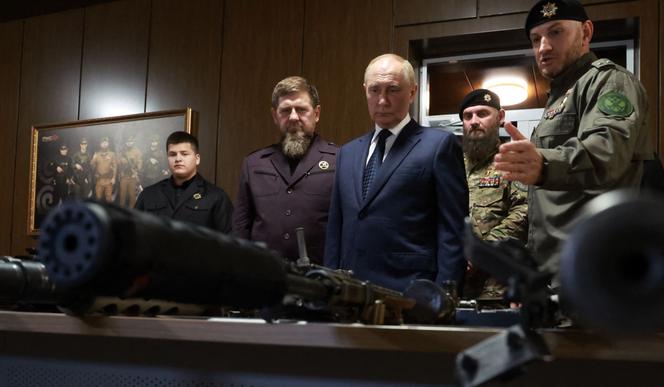


Barely back from a two-day official visit to Azerbaijan on August 18 and 19, Vladimir Putin embarked on a tour of the Russian Caucasus on Tuesday, August 20. The Russian president first visited the Beslan school in North Ossetia which was the scene of a bloody hostage-taking incident 20 years ago. Then, in the evening, he flew to neighboring Chechnya. His last visit to this republic, ravaged by two wars with Russia (1994-1996, then 1999-2000, with operations well beyond that), was in 2011.
In Grozny, where he was welcomed with honors by Ramzan Kadyrov, the autocratic Chechen leader who has been in power for almost 20 years thanks to Moscow's support, Putin visited one of the centers recruiting volunteers for the front in Ukraine. He spoke with local members of the Special Forces, who have been involved in the fighting from Mariupol in the Donbas to Kursk on Russian territory today.
"At various times, even the most difficult, there have been people like you who have not spared themselves, for the good of their homeland and the future of our people," enthused Putin. He then set off to visit a new mosque, a model of a new district of Grozny and took a stroll along the city's main thoroughfare, the aptly named Putin Avenue.
A few hours earlier, in Beslan, the president had similarly commented indirectly on the new front, using one word as a common thread: "The enemy." It was a way of explaining that the fighting in the Kursk region is an extension of a conflict that has become almost routine for Moscow. "Our enemy is not like us, even if he also has a head and hands. These are people with no morals or ethics. There is only their interest," Putin said.
To the mothers of Beslan, who came to talk about the terrorist attack on the school in this small town on September 1, 2004, and the heavy toll after the intervention of the special forces (more than 330 dead, including 186 children), he said: "Just as we have achieved our goals in the fight against terrorism, we will also achieve them in the fight against neo-Nazis, and we will undoubtedly punish the criminals."
The Ukrainian offensive launched on August 6 in the Kursk region is described as a "terrorist invasion," and the Russian army's retaliation is presented as an "anti-terrorist operation." More than 100, 000 Russians were forced to flee the border area.
Despite this humiliating, and unprecedented, Ukrainian incursion on Russian soil, the president did not make any great patriotic speeches on the country's defense. On the contrary, the Kremlin and its media outlets are spreading the message that the front is "stabilizing." The fighting in the Kursk region will last several months: it's a "new normal."
You have 18.63% of this article left to read. The rest is for subscribers only.
